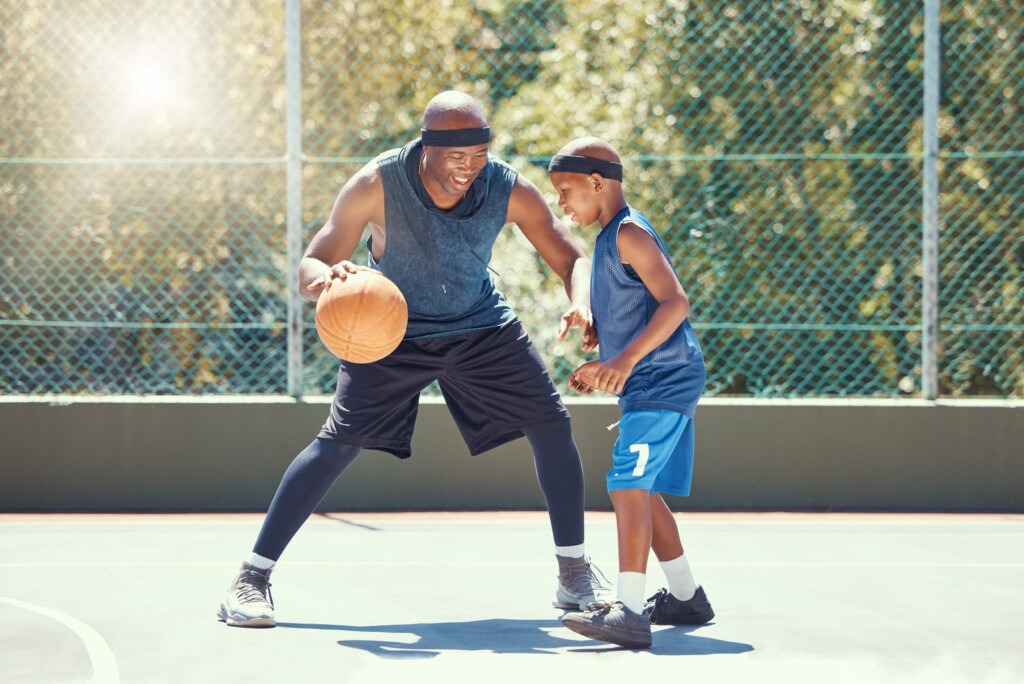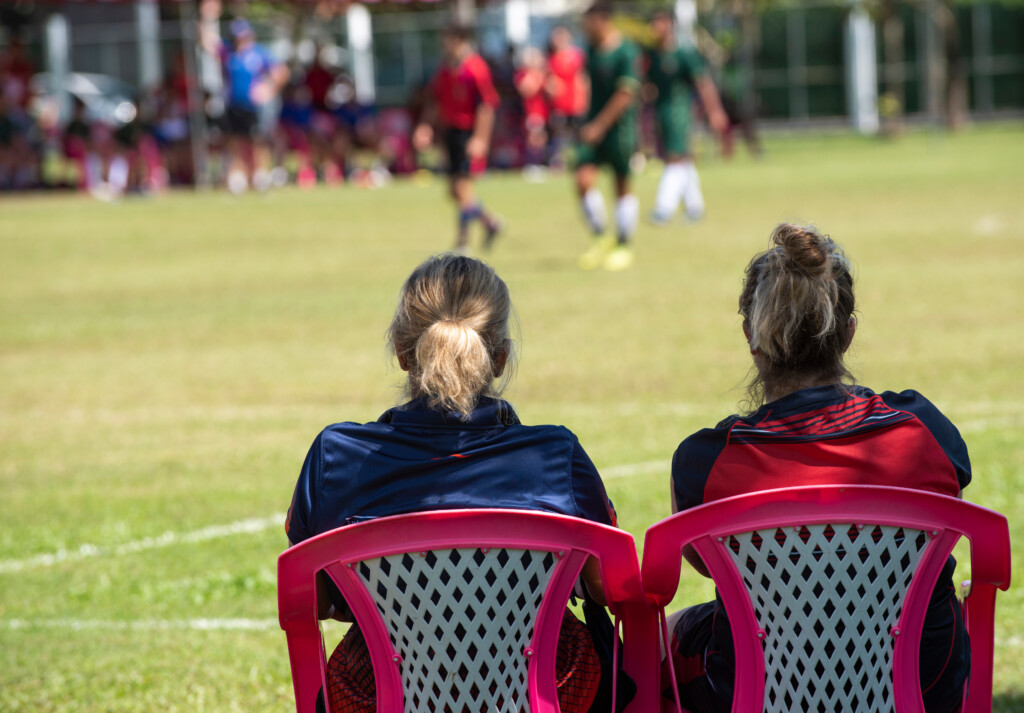Shifting the narrative: Empowering parents and fostering understanding of their roles in the youth sport system
March 18, 2024
Parents as promoters of positive youth sport experiences
One of the key social agents within the youth sport environment is the parent. They are commonly called upon to facilitate critical components of youth sport participation, such as providing material (registration and travel fees, equipment purchases, volunteerism) and emotional support like encouragement and feedback for athletes (Dorsch et al., 2021; Harwood & Knight, 2015). Parents’ social interactions within the sport environment and supportive behaviours have been shown to influence the quality of young athletes’ sport experiences and the developmental outcomes derived from sport participation (Tamminen et al., 2017). Although the existing literature does provide good information regarding parents’ role in facilitating quality athlete experiences related to performance, participation, and personal development, questions remain around why parents still frequently engage in negative behaviours during sporting events.
Parents as promoters of negative youth sport experiences
While it can be assumed that sport parents aim to foster positive outcomes for their children, instances, where their behaviours lead to negative interactions with coaches, program administrators, referees, or fellow parents are also common. For example, in various youth sport settings, it is common to notice scenes of parents passionately expressing their opinions, often through the demonstration of disruptive behaviours and heated exchanges with coaches and referees. Media portrayals frequently show these parents as erratic or out of control, overshadowing the essence of the valuable lessons youth sport aims to impart. Interventions from sport organizations to address these negative behaviours have included the development of codes of conduct and parental training courses, but their success has been somewhat limited (e.g., Dorsch et al., 2019; Christofferson & Strand, 2016; Reynolds, 2021).
Beneath the surface of animated sideline debates lies a narrative yet to be explored, one that delves into the complexities of parental involvement. This calls for a deeper exploration beyond the surface, delving into the complexities and underlying values, thoughts, and concerns that influence parents’ behaviours. This exploration necessitates a nuanced narrative acknowledging the different challenges, roles, and objectives influencing parents’ actions and reactions.

What is often missed is the absence of channels outside the public eye for parents to talk about their perspectives on their personal experiences and their children’s involvement without being judged. Understanding parents’ motivations and unique capabilities is essential, transcending the overcoming of the simple display of positive or negative behaviours during competitive events. To truly understand the dynamics of parental involvement in youth sport, it is essential to recognize the multifaceted nature of this group’s roles and provide platforms for a more nuanced and genuine expression of their experiences and concerns.
Parents as consumers of the youth sport experience
Although young athletes represent the users of youth sports programs, parents are intricately involved in the decision-making process related to their children’s enrollment and registration in programs. Sport administrators must grasp the elements that shape parents’ views on the quality of youth sport program design, their utilization of youth sport services, and the effects these programs have on their children.
Evidence exists to suggest that parents’ decision to enroll their children in sport can be influenced by several variables, such as the perceived potential benefits of sport, and that these decision-making processes can be linked with parents’ perceptions of satisfaction with and commitment to sport programs (Green & Chalip, 1998). For sports administrators to design and deliver high-quality sport programs, it would be beneficial to establish mechanisms where parents’ perceptions and experiences of their child’s sports programs are compiled and used in the program’s planning and decision-making process.
The main shortcomings of previous parent research and interventions targeted towards improving parent behaviour in youth sport are that parents are often seen as “problems” instead of resources. Researchers have overlooked the determinants of parental behaviours, including parents’ motivation, capabilities, and opportunities to contribute. Instead, previous work has mostly focused on simply reducing or altering parents’ negative behaviours. It is crucial to acknowledge that, for the most part, negative behaviours from parents in youth sport are the product of a conflict between parents’ perception of what “youth sport should be” and what “youth sport is.” For example, parents invest significant resources as consumers of their children’s sport involvement, yet often lack the avenues to provide feedback on how they feel about their experience (Murata & Côté, 2022).
Parents serve as spectators, fostering strong connections with fellow parents; and yet these relationships are rarely valued by sport organizations (Strydom et al., 2023). In other cases, parents act as volunteer coaches requiring specialized knowledge of the sport without appropriate training and coaching guidelines (KurtzFavero et al., 2023). Finally, parents frequently engage in their children’s sports endeavours as supportive friends, a role that is seldom recognized and understood (Hunter Smith & Côté, 2023). The complexity and occasional contradictions of these roles may clash with the emotional connection of every parent to want the best for their children while investing in intangible activities (sport) that they have little input in. Essentially, sport organizations need to understand the uniqueness and demanding nature of parents’ roles to better appreciate this groups’ involvement and potential contributions to the youth sport system.
The role of sport organizations 
Sports organizations could benefit from establishing mechanisms to gain deeper insights into the values, emotions, and thoughts influencing parental behaviours in specific sport settings. This involves bringing in a communication system that helps open dialogues without imposing lengthy tasks to be completed by parents or requiring extra training for parents. Below are 7 practical activities that can (a) help foster better relationships with parents, (b) provide parents with a better understanding of an organization’s objectives, and (c) ultimately minimize parents’ negative behaviours.
- Create tools that allow parents to offer regular feedback: Implement consistent feedback mechanisms, such as surveys or evaluations, to gather input from parents about their experiences and concerns. Use this feedback to make adjustments and improvements as needed.
- Introduce and facilitate online forums: Create online forums, social media groups, or virtual communities where parents can connect and share their experiences, challenges, and successes. These platforms can foster peer support and provide a space for parents to learn from one another.
- Form parent-to-parent mentorship programs: Establish mentorship programs where experienced and knowledgeable parents mentor newer parents. This peer-to-peer support system can be valuable for sharing insights, concerns, and best practices.
- Establish parent-coach partnerships: Put in place a formal structure to facilitate communication and collaboration between parents and coaches. As part of this structure, coaches can host regular meetings or check-ins to discuss team goals, expectations, and how parents can contribute positively to the sport experience.
- Develop video resources that model positive parenting behaviours: Develop and share video resources that highlight positive parenting behaviours and demonstrate effective communication strategies. Videos can be a powerful and engaging way to convey information and engage parents.
- Provide positive reinforcement and recognition: Recognize and celebrate parents who exhibit positive behaviours and sportsmanship. Publicly acknowledging and rewarding desirable behaviours can motivate other parents to follow suit.
- Suggest evidence-based resources for parents: Various materials can be provided to parents to gain valuable insights into the intricacies of youth sport, offering evidence-based information, practical tips, and effective strategies for navigating their roles and supporting their children’s athletic journeys. Whether exploring reputable websites, insightful blogs, or comprehensive articles curated by researchers, delving into parenting guides rooted in youth sports research, or benefiting from collaborative programs fostered by partnerships between researchers and practitioners, these diverse resources aim to empower parents with the knowledge and tools necessary to enhance their engagement.
In conclusion, the evolution of youth sport requires a holistic approach that not only understands and empowers parents but also establishes continuous and meaningful communication channels. By recognizing parents as invaluable contributors and understanding the intricate dynamics of their roles, sports organizations can create an environment where every parent feels that they are an integral part of their child’s sports journey. This shift from a problem-focused narrative to one of collaboration and understanding is essential for the holistic development of all members involved within the youth sport system.
About the Author(s)
Dr. Jean Côté is a Professor in the School of Kinesiology and Health Studies at Queen’s University. His research interests include examining the interaction between youth, their social dynamics (coaches, parents, peers), and the environment for developing personal assets and excellence in sport. X: @jeancote46
Mia KurtzFavero is an MSc student in the School of Kinesiology and Health Studies at Queen’s University, in the Performance Lab for the Advancement of Youth in Sport. Her research examines the influence of coach self-reflection on leadership behaviours and interpersonal skills. X: @mia_jkf
H.H. Smith is a student in the School of Kinesiology and Health Studies at Queen’s University, currently completing her MSc in Sport Psychology. Her research examines the outcomes of, and mechanisms within parent-child sport co-participation. Instagram/Threads: @haleyhuntersmith X: @hale_smith
Dr. Stuart Wilson is a postdoctoral fellow in the School of Kinesiology and Health Studies at Queen’s University. His research examines the factors influencing athletes’ performance development, with a focus on athlete-centered skills of recovery and practice, and how they interact with broader social (coaches, parents) and environmental influences (talent identification and development). X: @SGWilsonQU
References
Christofferson, J., & Strand, B. (2016). Mandatory parent education programs can create positive youth sport experiences. Strategies, 29(6), 8-14. https://doi.org/10.1080/08924562.2016.1231099
Dorsch, T.E., King, M.Q., Tulane, S., Osai, K.V., Dunn, R.C., & Carlsen, C.P. (2019). Parent education in youth sport: A community case study of parents, coaches, and administrators. Journal of Applied Sport Psychology, 31(4), 427-450. https://doi.org/10.1080/10413200.2018.1510438.
Dorsch, T., Wright, E., Eckardt, V., Elliott, S., Thrower, S., & Knight, C. (2021). A history of parent involvement in organized youth sport: A scoping review. Sport, Exercise, and Performance Psychology, 10, 536-557. doi:10.1037/spy0000266.
Green, C.B., & Chalip, L. (1998). Antecedents and consequences of parental purchase decision involvement in youth sport. Leisure Sciences, 20(2), 95-109. https://doi.org/10.1080/01490409809512268
Harwood, C.G., & Knight, C.J. (2015). Parenting in youth sport: A position paper on parenting expertise. Psychology of Sport and Exercise, 16(1), 24-35. https://doi.org/10.1016/j.psychsport.2014.03.001
Smith, H., & Côté, J. (2023). Parent-child-co-participation in sport and physical activity: A scoping review. International Journal of Sport and Exercise Psychology. https://doi.org/10.1080/1612197X.2023.2242375
KurtzFavero, M., Murata, A., Strydom, N., Tse, T., Costa, G.H., & Côté, J. (2023). Exploring the implementation and practices of the parent-coach dual role. The Sport Psychologist, 37(3), 179-189. https://doi.org/10.1123/tsp.2022-0144
Murata, A., & Côté, J. (2022). Considering the cost(s) of the game: Consumer behavior and parents in youth ice hockey. Journal of Applied Sport Psychology, 35(5), 775-792. https://doi.org/10.1080/10413200.2022.2098878
Reynolds, J.F. (2021). An intervention to address youth sport parent spectator behaviors in Louisiana: Lessons for future research and social work practice. Child and Adolescent Social Work Journal, 38, 463-474. https://doi.org/10.1007/s10560-021-00771-y
Strydom, N., Murata, A., & Côté, J. (2023). Missing out, as well: The absence of youth sports and its effect on parents during the COVID-19 global pandemic. The Sport Psychologist, 37(4), 233-243. https://doi.org/10.1123/tsp.2022-0088
Tamminen, K.A., Pucher, Z.A., & Povilaitis, V. (2017). The car ride home: An interpretive examination of parent-athlete sport conversations. Sport, Exercise, and Performance Psychology, 6(4), 325-339. https://psycnet.apa.org/doi/10.1037/spy0000093
The information presented in SIRC blogs and SIRCuit articles is accurate and reliable as of the date of publication. Developments that occur after the date of publication may impact the current accuracy of the information presented in a previously published blog or article.
